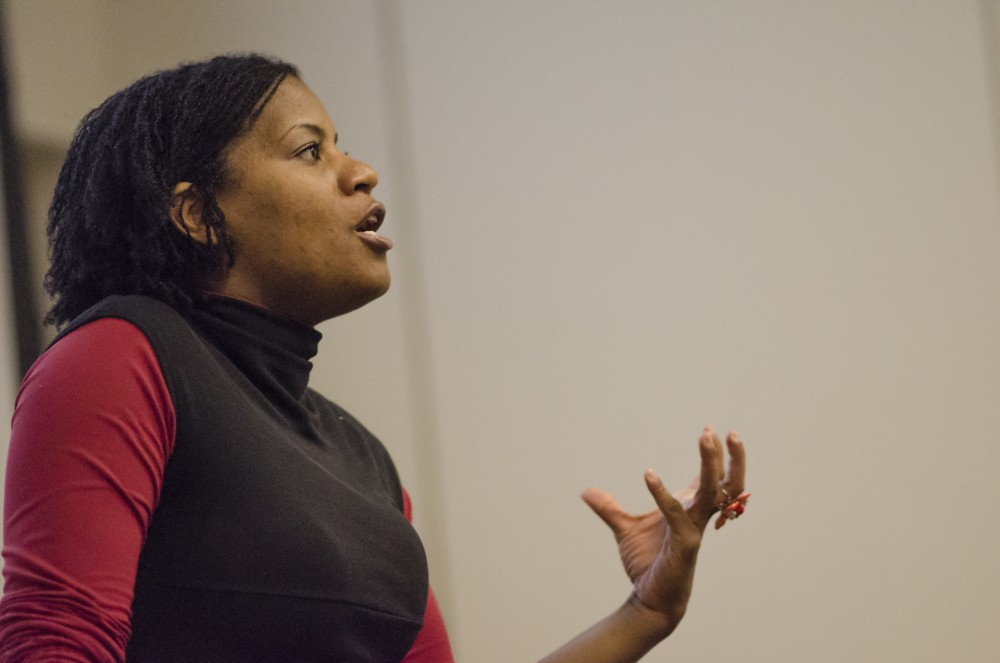Sex and the City: Black Women’s Honorable Intentions

GVL/Jessica Hollenbeck Erika Edwards
Mar 24, 2013
Students packed into one of Lake Michigan Hall’s two lecture halls on March 19 to hear Dr. Erika Edwards’ lecture, “Sex and the City: Black Women’s Honorable Intentions,” on Afro-Argentine populations in Buenos Aires during the 1700s and 1800s. People overflowed the space, with some even seated on the floor.
Edwards, a Fulbright recipient, is an assistant professor of Colonial Latin American History from the History Department of the University of North Carolina-Charlotte.
Though some students attended out of personal interest, the vast majority of the audience came for the pedagogical experience – in other words, their professors told them to attend.
“It gets them exposed to not just their professor telling them important and interesting things,” said Assistant Professor of History at Grand Valley State University Michael Huner. “In that context, just to hear another voice gives feedback that it’s not just their professor telling them things.”
Edwards is a GVSU graduate who discovered her desire to research the experiences of black people in Argentina during her repeated study abroad opportunities throughout her academic career.
“I was a junior in college at GVSU studying abroad to improve my Spanish. I continued for the next 12 years traveling between Argentina and grad school, studying the black history of Argentina,” Edwards said. “I consider myself part of the African Diaspora and the ability to tell the story of somebody else in the African Diaspora is part of what it means to be an African scholar.”
Edwards said that the three main themes of her research consist of Africa Diaspora, Argentina, and sexuality. What drives her research is, “The difference of understanding of race allowed the disappearance of blacks in Argentina.”
The lecture covered the socio-economic realities of life in the Argentina barrios during the eighteenth century colonial period, and the various styles of social interaction that took place throughout the cities of the time. She described the social and gender roles of the different white and colored peoples, their status of free or slave, their level on the social ladder, and the punishments enacted when social roles and codes of conduct were broken.
In amorous relationships involving white males and black females, black women formed alternative lifestyles that exposed them to greater flexibility and challenged gender roles. Forced to live outside the protection of marriage, black women in Latin countries became responsible for keeping house and children, Edwards said.
These practices gave black women a new identity that challenged traditional gender roles and empowered them to fight for their freedom.
Sponsored by African & African American Studies, Latin American Studies, Sigma Lambda Upsilon/ Senoritas Latinas Unidas Sorority, Inc., Area Studies and the History Department, the event was a huge success.
Mayra Sanchez, President, and Janissa Rodriguez, Vice President of Sigma Lambda Upsilon/Senoritas Latinas Unidas Sorority Inc. said they were both excited for their organization to be a part of this event.
“We felt honored to be able to serve the GVSU community as well as educate students about the struggles that Latina American women face, specifically Black Latina American women,” Rodriguez said. ”We believe that it is important for others to understand the struggles that Latinos have overcome and are still facing today as they work towards a better life.”
The presentation was well received by the audience, with many people remaining afterward to ask questions and discuss the lecture with Edwards.
“I thought it was wonderful! It was really interesting because it related to a bunch of other Spanish classes that I’ve already taken in regards to race and how it evolved through Latin America because of colonization,” GVSU student Carly Hall said.
Not only was this a positive experience for those that attended and those organizations involved, it was also positive Edwards as well.
“It was a chance to give back to the professors that I had here at GVSU that helped me so much,” Edwards said. “Its nice for my professors to see what I have done.”
[email protected]





















